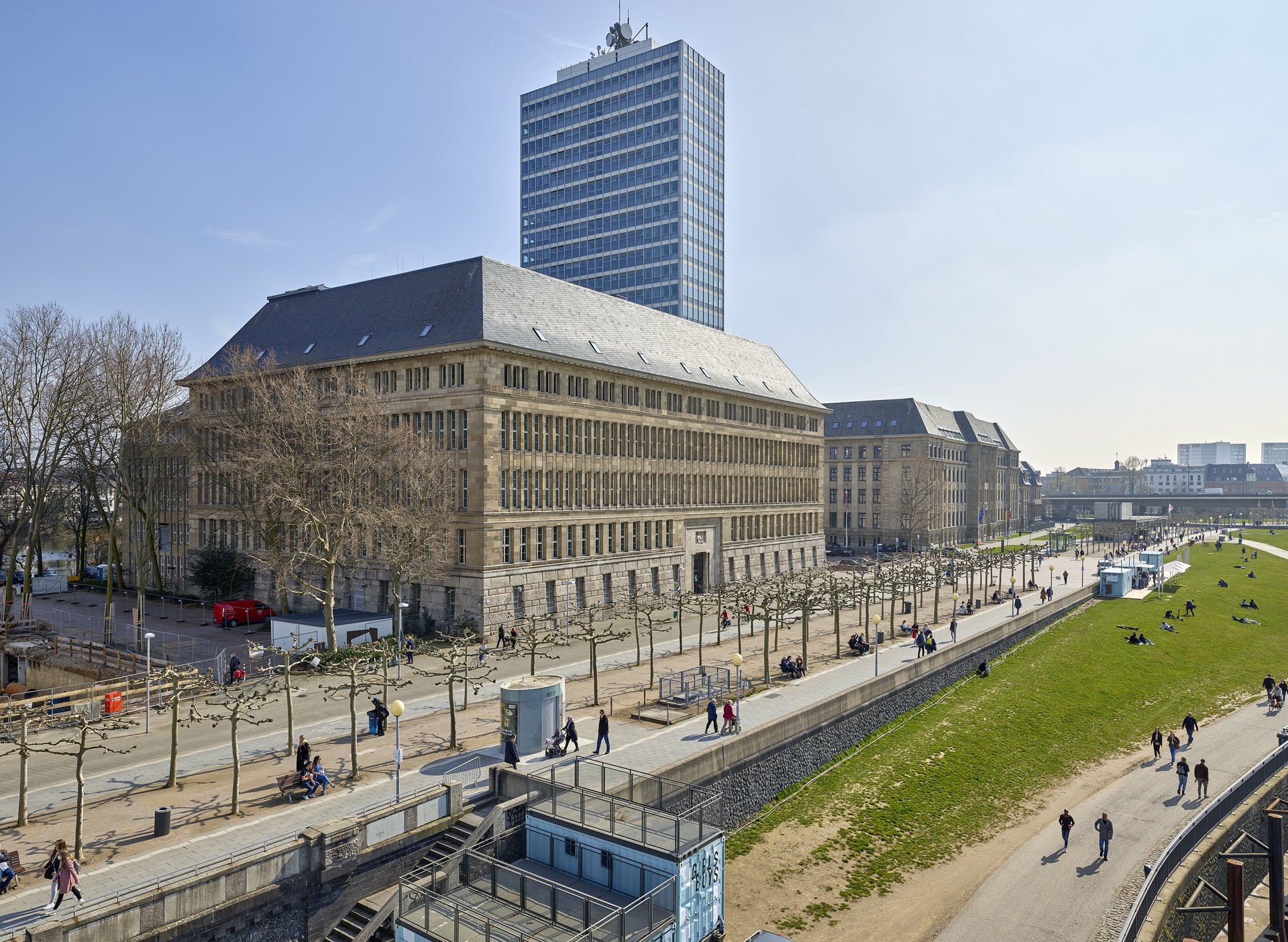
About us
Foundation of House of History of North Rhine-Westphalia
Establishing a new history museum
With the founding of the House of History North Rhine-Westphalia, a modern museum is dedicated to the contemporary history of Germany’s largest federal state. Set on Düsseldorf’s Rhine embankment and close to the North Rhine-Westphalia state parliament, the museum is housed in the Behrens building. This important historical building, originally designed by Peter Behrens in 1910 to house the Mannesmann factory’s former administration, served as the official residence of the North Rhine-Westphalian Minister Presidents until 1953.
Statutory task
In a legislative act ratified on 18 December 2019, the NRW state parliament entrusted the Foundation House of History North Rhine-Westphalia with the task of vividly conveying and describing the history of the federal state of North Rhine-Westphalia, its establishment and development.
The House of History North Rhine-Westphalia is to present the history of Germany’s most populous federal state in an exciting, informative way appealing to a wide audience. Inspired by the core principle of “Democracy, Diversity, Change”, it invites visitors to actively engage with North Rhine-Westphalia’s past, present and future.
Furthermore, the Foundation’s mandate includes the task of establishing a museum collection. Concretely, the Foundation takes into its collection those artefacts and objects which illustrate North Rhine-Westphalia’s historical events and developments, stories and history. In this way, we can play our part in expanding and consolidating the cultural memory of our federal state.
Organisation
The Foundation House of History North Rhine-Westphalia is an independent state foundation under public law. The Foundation has four organs – the Board of Trustees, the Presiding Committee, the Accademic Advisory Board and the Working Party of Civil Society Groups.
Board of Trustees
The Board of Trustees resolves all fundamental issues relating to content, finances and staff. It is composed of the members of the state parliament’s Presidium (the Speaker and deputies), a member of each parliamentary party represented in the state parliament, five members of the state government and the chairpersons of both the Rheinland and the Westfalen-Lippe regional
authorities. The state parliament’s President, André Kuper, MdL, chairs the Board of Trustees.
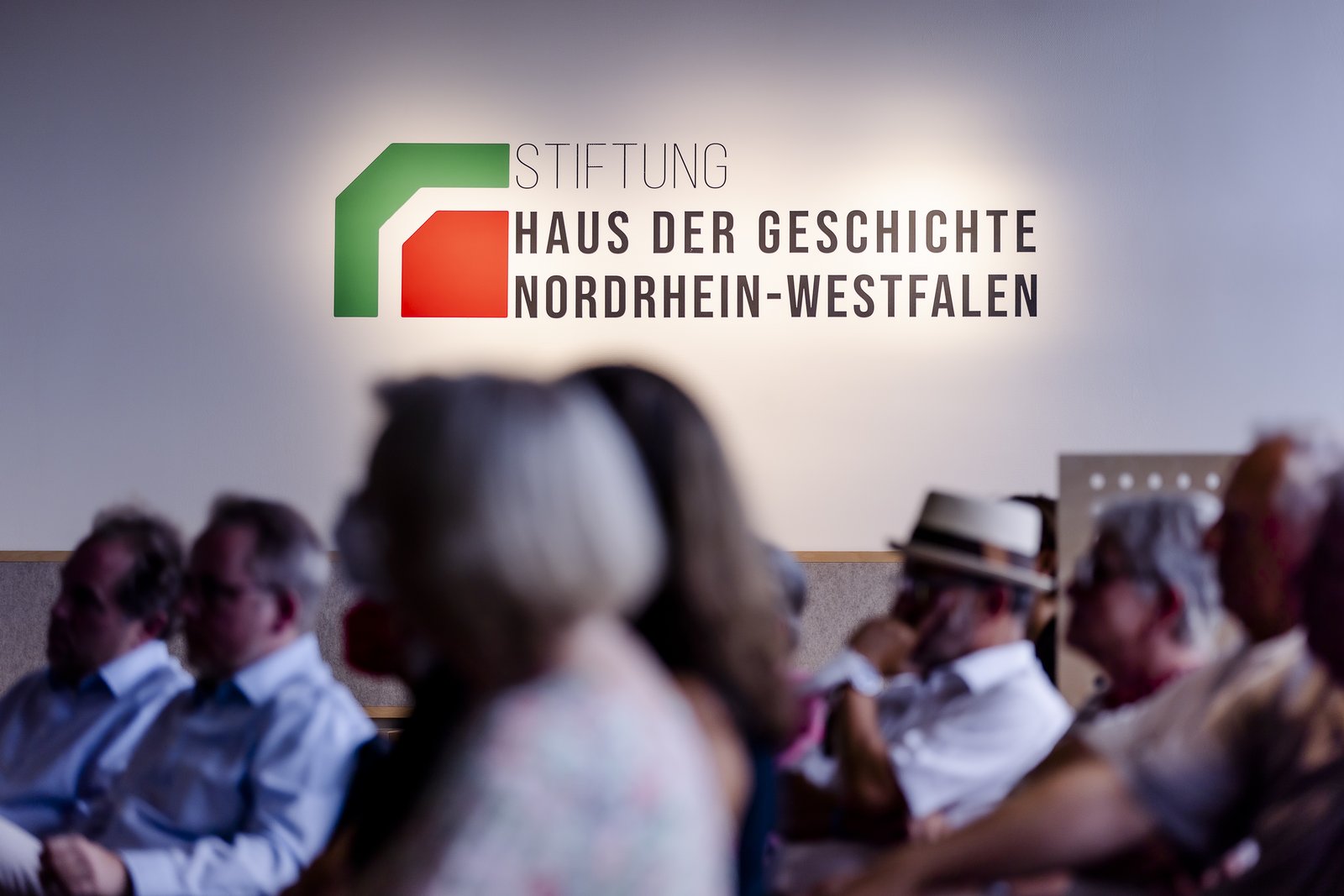
Presiding Committee
As of February 2020, the Presiding Committee conducts the Foundation’s day-to-day business in the phase of establishing the museum. The members are Prof. Dr. Hans Walter Hütter (Chairperson), President (ret.) of the Haus der Geschichte der Bundesrepublik Deutschland Foundation, Dr. Gabriele Uelsberg, Director (ret.) LVR-LandesMuseum Bonn, and Prof. Heinrich Theodor Grütter, Director Ruhr Museum, Essen, and Member of the Board of the Zollverein Foundation.
Accademic Advisory Board
The Accademic Advisory Board comprises up to 15 experts appointed by the Board of Trustees for a period of five years. The Council members include historians, political scientists and museum specialists, and they advise the Board of Trustees as well as the President’s Office. The Council chairperson is Prof. Dr. Karl-Rudolf Korte, Professor of Political Science, University of Duisburg-Essen, and Director of the NRW School of Governance. The deputy chairpersons are Dr. Constanze Itzel, Director, House of European History, Brussels, and Dr. Frank Bischoff, President of the State Archives of North Rhine-Westphalia, Chairperson Gesellschaft für Rheinische Geschichtskunde, Duisburg.
Working Party of Civil Society Groups
The Working Party of Civil Society Groups comprises up to 15 representatives of civil society groups. They are appointed by the Board of Trustees for a period of five years. The Working Party advises the Board of Trustees and the President’s Office, and supplements the professional expertise of the Academic Advisory Council.
EXHIBITIONS
OUR STATE
The anniversary exhibition “OUR STATE. 75 Years of North Rhine-Westphalia” was the first show staged by the Foundation House of History North Rhine-Westphalia. It marked the 75th anniversary of establishing the federal state of North Rhine-Westphalia. The exhibition opened in August 2021 in the building which will later house the museum and ended in August 2022.
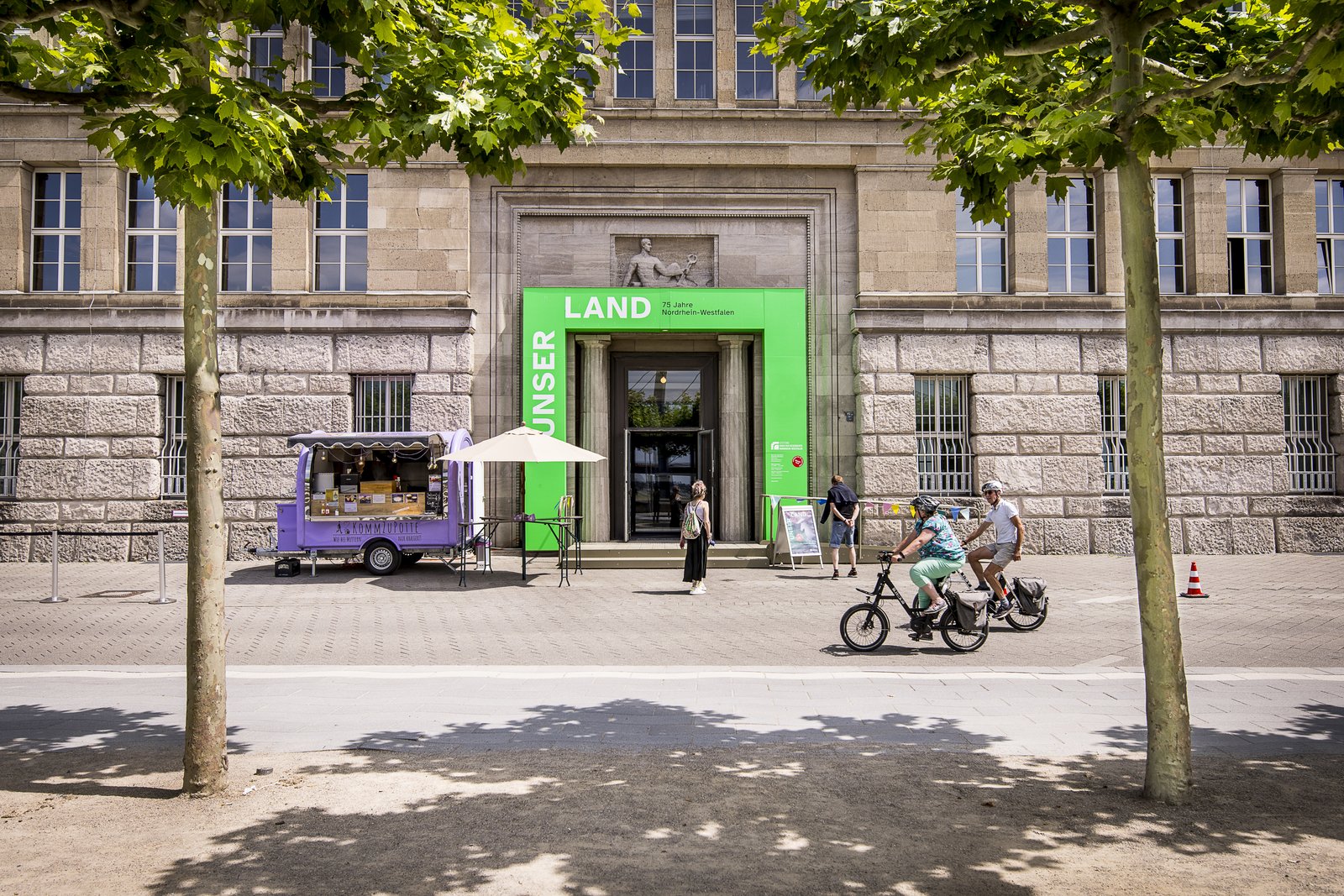
Following the first exhibition, the Foundation House of History North Rhine-Westphalia is in the process of drafting the conceptual design of a permanent exhibition on the history of North Rhine- Westphalia. The objective is to open the House of History North Rhine-Westphalia in the Behrens building with a large permanent exhibition on the history of North Rhine-Westphalia and establish the museum’s appeal to a broad audience. A series of other exhibition formats and events are planned until the new contemporary history museum is opened.
110 Years of the Behrensbau
Latest exhibition "110 Years of the Behrensbau. Architecture and History", 24 May to 5 November 2023
The Behrensbau on the banks of the Rhine in Düsseldorf lives through 110 turbulent years. Modern architecture, a chequered economic history, political events, wars and crises of an entire century all meet under one roof. The exhibition “110 Years of the Behrensbau. Architecture and History” is being held on the historic site and looks at the building, its architect Peter Behrens and the Mannesmann group.
In December 1912, the corporation moves into the Behrensbau as its new headquarters. At that time, the office building is one of the most modern in Germany. The architecture is pioneering and flexible, creating space for a working world in transition.
Photos, sketches and design objects illustrate the career of Peter Behrens, who designs the administrative head office for the Mannesmannröhren-Werke. The exhibition traces the path of Germany’s largest pipe and tube manufacturer Mannesmann from a family company through to the takeover battle with Vodafone in 2000 and brings it to life.
Selected objects and historical documents also show how the Behrensbau repeatedly becomes the scene of political events: French soldiers occupy the building in 1923 and after the Second World War, the British Military Government uses it as its command HQ. Later, it becomes the seat of the North Rhine-Westphalian state government in the summer of 1946.
Finally, the exhibition looks into the future of the Behrensbau, the site of the House of History North Rhine-Westphalia.
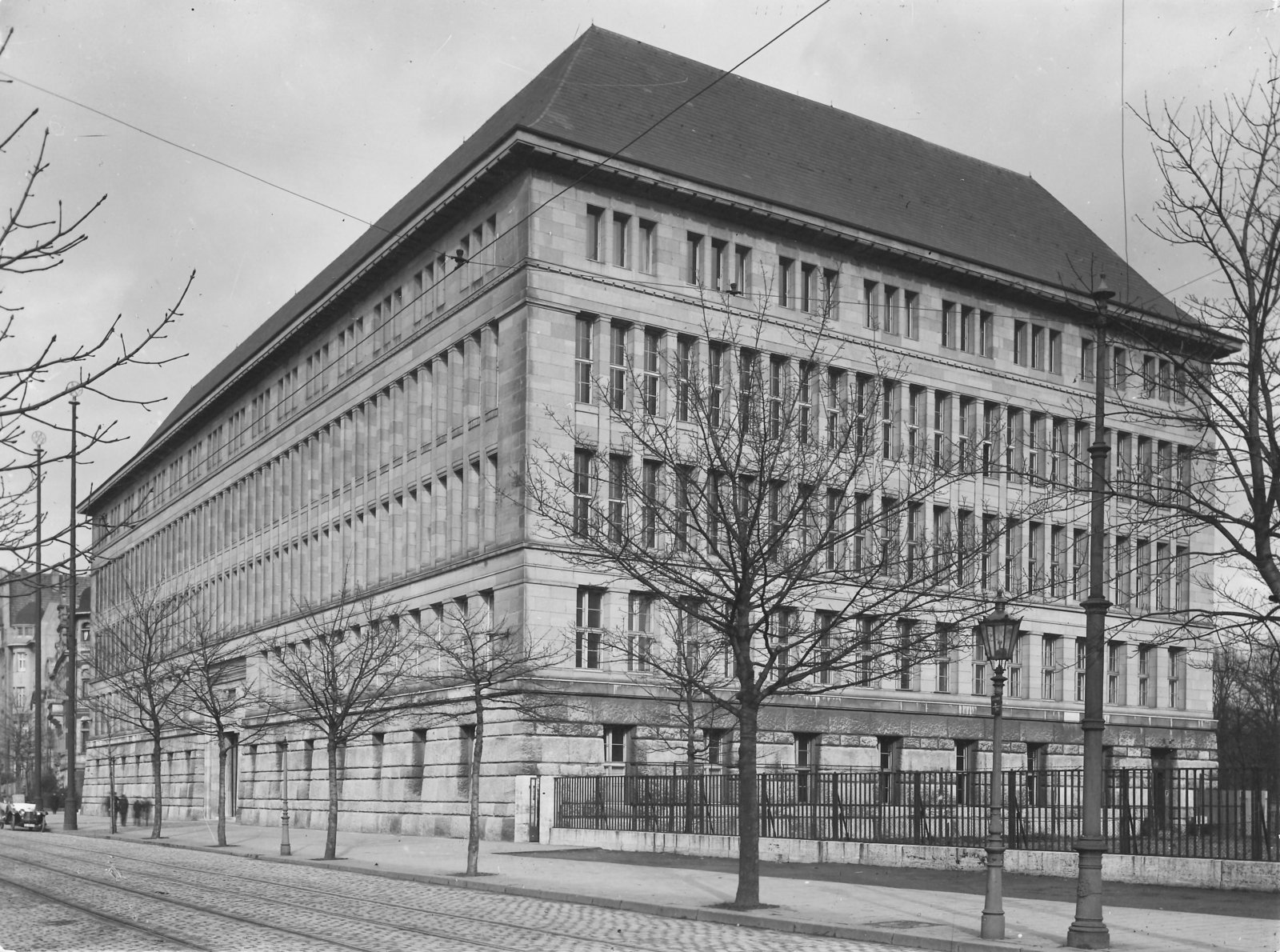
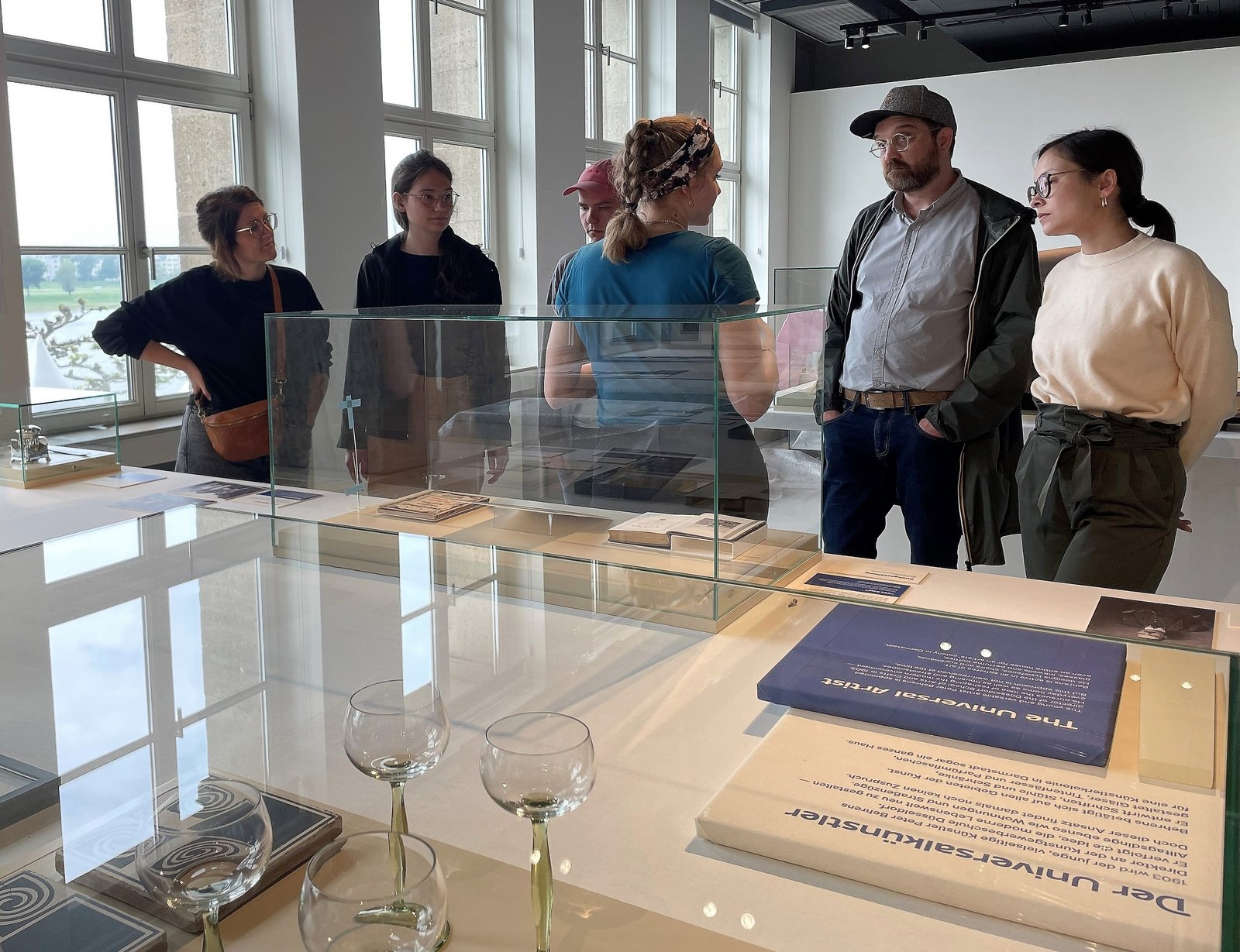
Exhibition "110 Years of the Behrensbau. Architecture and History"
Opening hours
24 May to 5 November 2023
Tuesday to Friday: 9 a.m. – 6 p.m.
Saturday, Sunday and Public Holidays: 10 a.m. – 6 p.m.
Closed on Mondays
Guided tours
Group tours: we offer tours for groups by arrangement. Participation in the guided tours is free of charge.
For further information please contact our visitor service, Tel. +49 211 513 613-33, besucherservice@hdgnrw.de
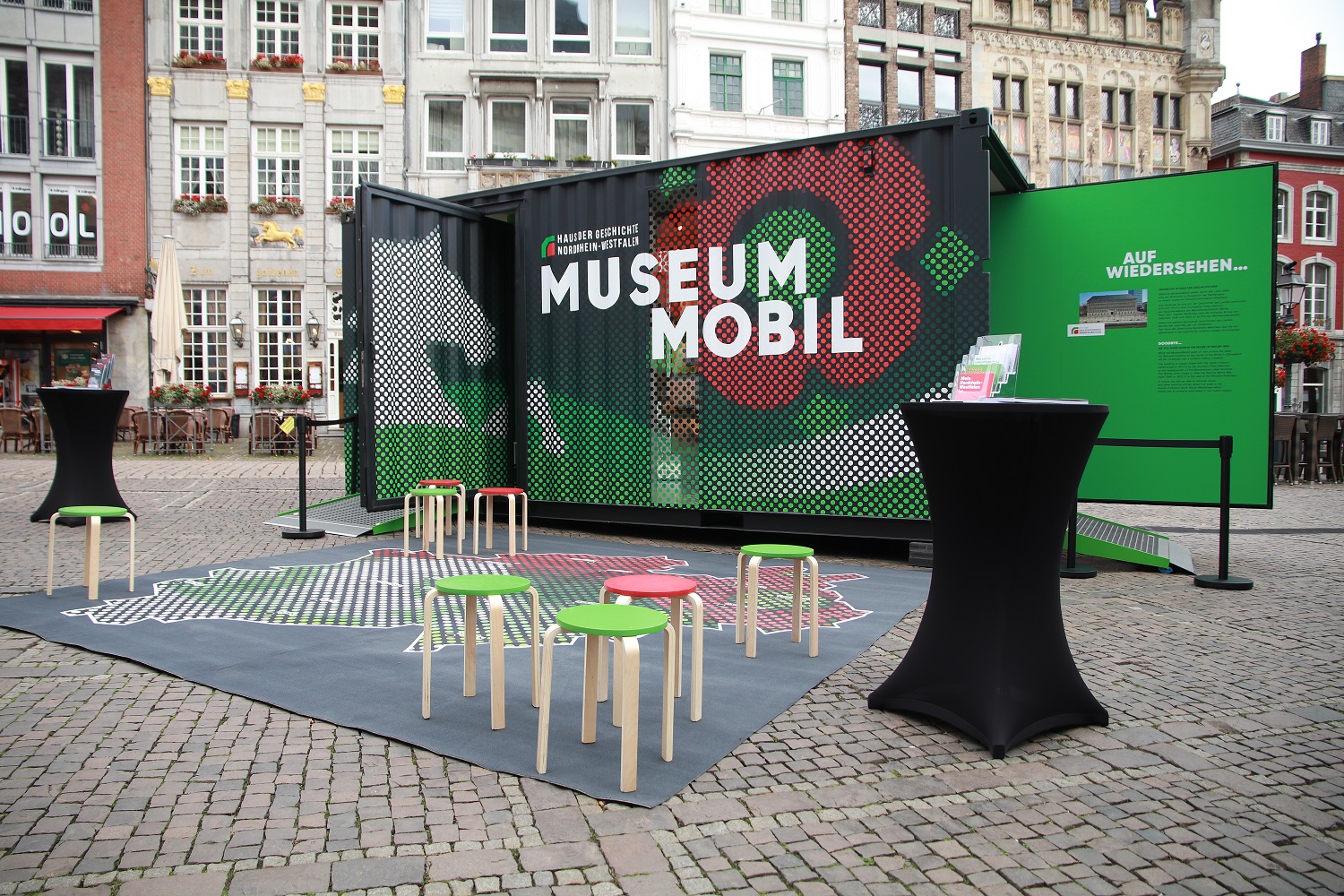
MuseumMobile
We are looking for your NRW (hi)story
The history of North Rhine-Westphalia is as diverse as its regions and its inhabitants.
What constitutes North Rhine-Westphalia? What (hi)stories shape the various parts of our state? What are people’s concerns in rural and municipal areas?
In search of our state’s history, the House of History North Rhine-Westphalia is coming direct to you with its mobile exhibition. The MuseumMobil invites you to rediscover the state and tell us your NRW (hi)story. The centrepiece of the exhibition is the MuseumMobil container which will visit all 53 districts and independent cities in the state over the next four years, stopping for ten to twelve days in each place.
MuseumMobil – an exhibition full of (hi)stories
53 selected items from all parts of the state tell stories that surprise, move and arouse memories – from the state’s founding to the present day. Interviews with contemporary witnesses bring history to life.
MuseumMobil – join in!
Come and talk to us! Tell us what you think constitutes North Rhine-Westphalia. Bring your personal items and stories along to the “Collection Saturdays“ and participate in building up the new museum’s collection. Discussions of topical subjects as well as offers aimed specifically at groups, schools and children complement the programme.
We look forward to your visit!
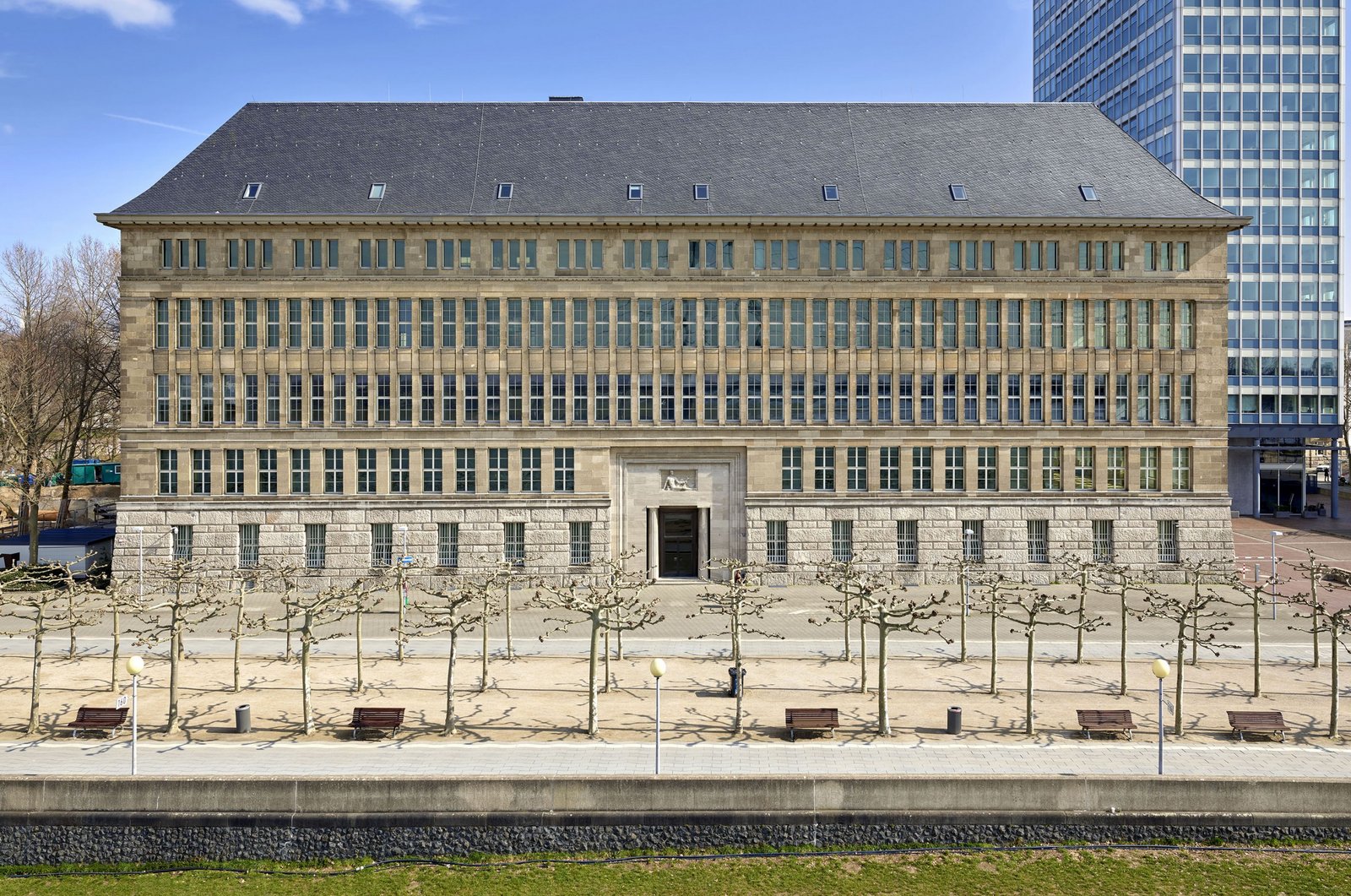
Building
The Behrens building — a historic location with an eventful history
The Behrens building, also known as Mannesmann House, was the venue of our anniversary exhibition “OUR STATE. 75 Years of North Rhine-Westphalia”. The building will be home to the new House of History North Rhine-Westphalia museum. The history of this location, with its eventful past and intimate connection to North Rhine-Westphalia’s history, goes back to 1910.
Designed by architect Peter Behrens, the building was intended to house the headquarters of the then Mannesmann steel pipe company. As early as 1912, the Behrens building, set prominently on the Düsseldorf bank of the River Rhine, was ready for occupancy. Today, the building is ranked as an icon in the history of administration architecture.
Tradition meets progress
In its day, the Behrens building was highly modern, combining tradition with progress. In its aspirations and external form, this office block was inspired by stately town residences informed by neo-Renaissance and neo-classical architecture. Apart from Peter Behrens, the other architects playing a role in the design included Walter Gropius, later the founder of Bauhaus and Mies van der Rohe.
At that time, this was one of Germany’s most modern office blocks. Thanks to its steel “skeleton frame” construction, it offered – then as now – considerable flexibility in the use of interior space. Since the offices were facing outwards, the Behrens building was among the best lit office blocks of its day. Subsequently, the initial Behrens building was expanded by two other buildings. To the east, the Väth Building, dating from 1937 to 1938, was designed by Hans Väth, Mannesmann’s Director of Construction. The neighbouring Mannesmann Tower, commissioned by Mannesmann AG from architects Egon Eiermann and Paul Schneider Esleben, was built between 1956 and 1958.
Political and historical significance
The Behrens building quickly gained political importance.
- In March 1923, during the military occupation of the Ruhr, the administration building was seized by French troops and served as the headquarters of the occupation authorities.
- Even though the Second World War left its traces on the Behrens building, it only suffered relatively minor damage in the Allied bombing raids.
- From 1945 – 1946, after the end of the war, the building served as the headquarters of the British Military Government.
- In August 1946, with the establishment of the federal state of North Rhine-Westphalia, the Behrens building became the seat of the Senate Chancellery and official seat of the first state governments under Minister Presidents Rudolf Amelunxen and Karl Arnold.
- In 1953, the neighbouring Villa Horion became the official residence of the NRW Minister President.
- From the mid-1950s to 2000, the Behrensbau became the headquarters of the Mannesmann Board of Directors and an office and administration building.
- In 1982, it was granted heritage status.
- In 2000, the Behrens building was the scene of the takeover battle between Mannesmann AG and the telecommunications company Vodafone.
- In 2008, the state of North Rhine-Westphalia acquired the building.
- Four years later, Vodafone vacated the Behrens building.
- From 2015 to 2017, at the height of the European refugee crisis, parts of the building were used as accommodation for refugees.
Renovation and conversion to the House of History North Rhine-Westphalia
The Explanatory Statement to the Act establishing the Foundation defined the Behrens building as the future venue of the House of History North Rhine-Westphalia. Soon after, renovation and conversion work started. To begin with, the museum areas on the first floor were provisionally constructed. In this way, as an architectural and historical testament to North Rhine-Westphalia’s history, the Behrens building itself will be the largest exhibit in the planned permanent exhibition.
On 27 August 2021, with its anniversary exhibition “OUR STATE. 75 Years of North Rhine-Westphalia”, the Foundation House of History North Rhine-Westphalia opened its first show in its future location.